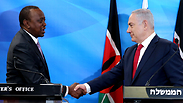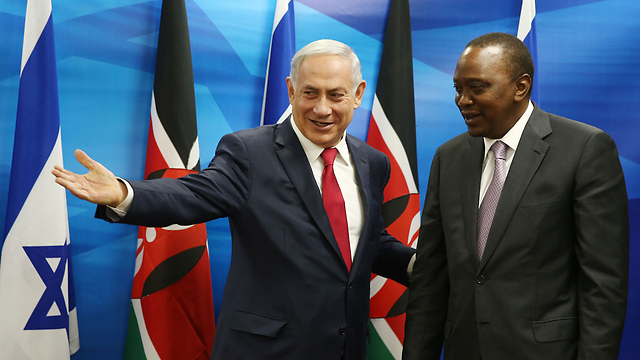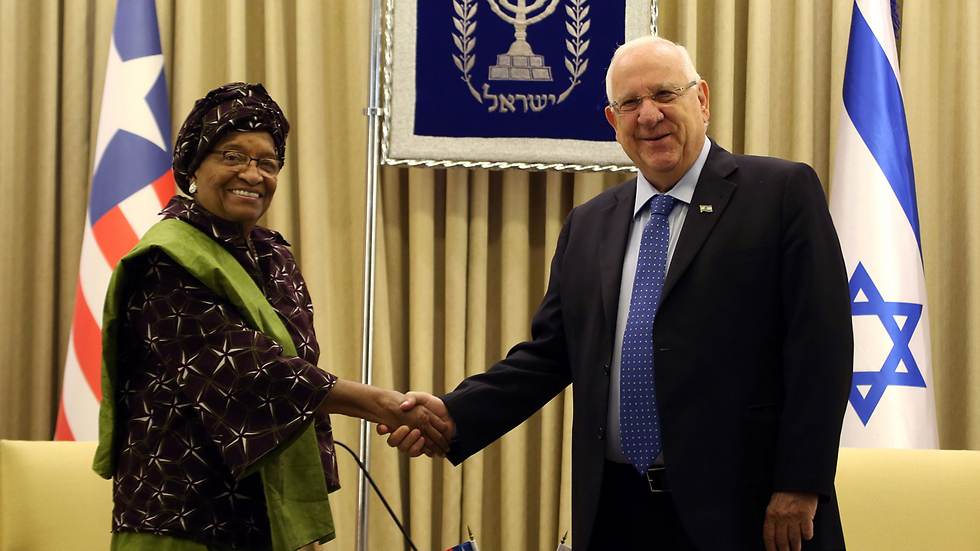
Prime Minister Benjamin Netanyahu will be setting off on a visit of four African nations starting on Monday. The trip will see the Prime Minister visit the countries of Uganda, Rwanda, Kenya, and Ethiopia, and requires unprecedented security arrangements.
He will begin his visit with a ceremony in Uganda to commemorate 40 years since the Entebbe operation.The ceremony will take place in the old terminal where over 100 Israelis and Jews were held hostage by Palestinian and German terrorists.
Israel is hoping that the visit - the first by an Israeli prime minister to sub-Saharan Africa in three decades - will usher in a new era in which it provides African states with security and agricultural assistance in return for support in international forums.
Israel has a long history of involvement in Africa, sending experts in agriculture and development, as well as military advisers and mercenaries, over the years.
Netanyahu's visit caps a budding rapprochement in recent years initiated by Defense Minister Avigdor Lieberman, who, as foreign minister a few years ago, toured the continent on two occasions after no Israeli foreign minister had visited in two decades.
In turn, dozens of African dignitaries have visited Israel in recent years, including Kenyan President Uhuru Kenyatta and Liberian President Ellen Johnson Sirleaf. Dore Gold, a senior Israeli diplomat, traveled to South Africa in March,.
"Israel is coming back to Africa; Africa is coming back to Israel. It's happening in a big way," Netanyahu told African ambassadors at the launch of the Israeli parliament's caucus for Israel-Africa relations in February. Netanyahu said last month he will seek government approval for a $13 million plan to strengthen economic ties and cooperation with African countries.
Israel played a prominent role in assisting newly independent African countries in the 1960s, but those relations crumbled in the 1970s, when Arab countries pressured African nations to limit or cut ties with Israel.
With the rise of jihadism across the continent, from Boko Haram in Nigeria to al-Qaida-linked al-Shabab militants in Somalia, Israel has found common ground with countries like Kenya, Uganda and Nigeria.
"Any victory of radical Islam in any part of Africa immediately impacts us," said Avi Granot, the former head of the Israeli Foreign Ministry's Africa division. "The more defeats (militants) face, whether it is in Nigeria, Cameroon, Somalia or Chad, then it's a victory also for the Middle East."
While Israeli military exports to Africa are limited, it provides several countries with security training and assistance. Granot cited Israel's deployment of a team of security experts following the 2013 al-Shabab attack on a Nairobi mall. He said Israel, with its vast experience fighting militants, could continue to offer training on terror prevention.
Israeli defense officials say intelligence sharing is limited to a few close allies for now. Israel has military ties with several African countries, and Israel's Defense Ministry has given clearance for private Israeli security firms to operate in some nations, including some arms sales.
In exchange for its expertise in security and other fields, Israel wants African states to side with it at the UN, where the General Assembly overwhelmingly recognized Palestine as a nonmember observer state in 2012. The Palestinians have used their upgraded status to launch a diplomatic offensive against Israel and its occupation of lands where the Palestinians hope to establish a future state.

"We're talking about some 45 countries in sub-Saharan Africa who vote in one bloc at the UN," said Arye Oded, a former Israeli diplomat and expert on Africa. "Netanyahu wants to improve relations with these countries ... and wants more countries to not vote against us at the UN."
According to officials, the overall cost of the visit will be NIS 28 million, which will include no less than four planes; one plane will be chartered and hold the Prime Minister's Bureau, another plane will carry 140 people to Entebbe and will include IDF soldiers who participated in the Entebbe operation and some of the hostages, and two Hercules planes will have the Prime Minister's motorcade inside of them as well as a field hospital which is to be donated at the end of the trip.
The Prime Minister is also taking a delegation of Israeli businessmen with him in cooperation with the export institute. He will also be accompanied with Culture and Sports Minister Miri Regev.

















